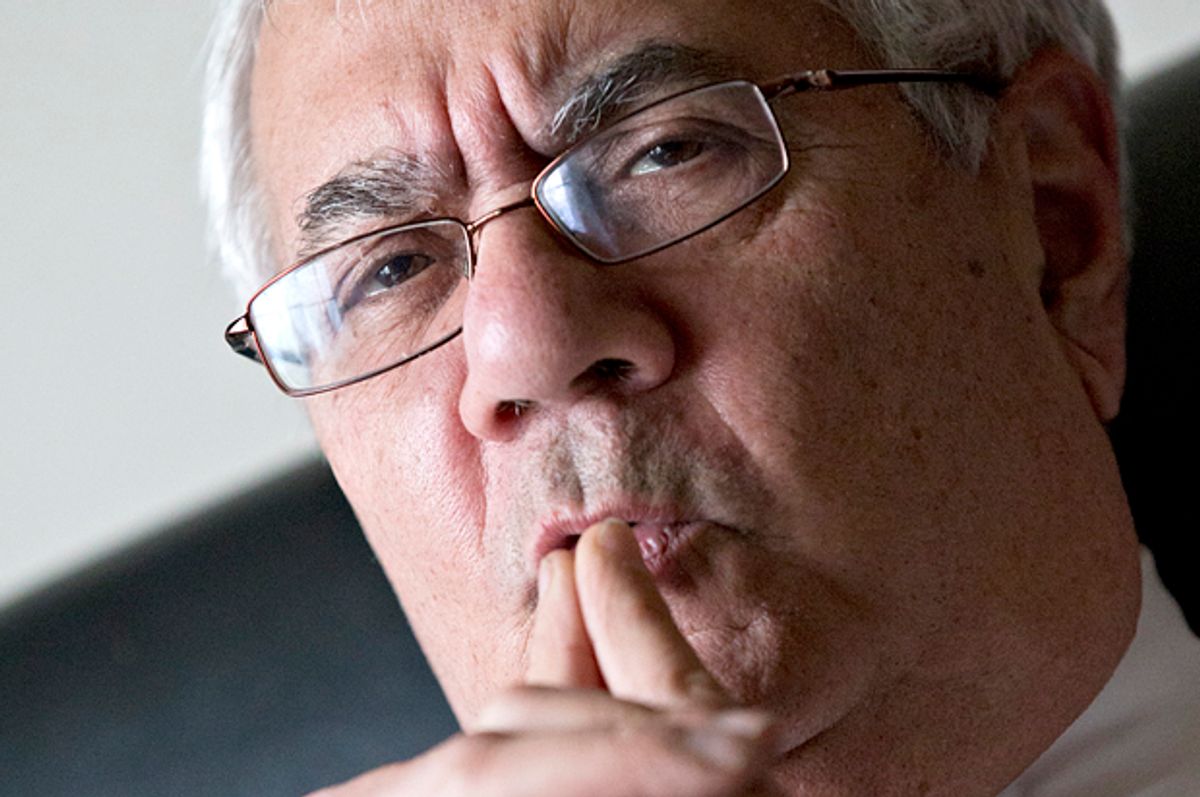Barney Frank, the Massachusetts liberal who served in the House from 1981 to 2013, dismissed the presidential campaign of Vermont Sen. Bernie Sanders as nothing more than "wishful thinking" that will only harm Democratic frontrunner Hillary Clinton's chance of ultimately taking the White House in a new op-ed for Politico discouraging progressives from supporting Clinton's Democratic primary challenger .
In the post, titled "Why Progressives Shouldn’t Support Bernie," the former Massachusetts congressman urged Democratic primary voters to steer clear of his fellow New Englander, warning "wishful thinking won’t win the White House."
Frank pointed to the gleeful cheerleading of Sanders' challenge to Hillary Clinton from neoconservatives like Bill Kristol to argue that Sanders only serves to weaken Clinton before her general election match-up. According to Frank, a Sanders candidacy -- with his poll number steadily gaining on Clinton's lead -- would only distract from the circus that is the 15-person Republican primary:
Republicans fear that if Hillary Clinton is nominated fairly easily, while they are locked in a bitter, lengthy, ideologically charged series of primaries with a large cast of characters of varying degrees of plausibility, she gets a head start for the real fight.
Of course Republicans recognize that at its most vigorous, a debate between Clinton and Sanders on how — not whether — to toughen financial regulation or diminish income inequality will fall decibels short of the fundamental arguments between Ted Cruz and Jeb Bush on immigration, Lindsey Graham and Rand Paul on military intervention, Ben Carson and Mike Huckabee against many others on how sharply to press against same-sex marriage, and Donald Trump and all of the others on the role of rational discussion in politics. But they believe boosting Sanders’ candidacy is their only way to prevent Clinton emerging as the nominee with broad support early in the process, strengthening her position in November.
They are correct.
The former chairman of the House Financial Services Committee argued that despite longstanding complaints from progressives on Clinton's economic centrism, such criticism is "wholly without basis":
Well before the Sanders candidacy began to draw attention, she spoke out promptly in criticism of the appropriations rider that responded to the big banks’ wish list on derivative trading. She has spoken thoughtfully about further steps against abuses and in favor of taxing hedge funds at a fairer, i.e., higher, rate.
Frank dismissed calls to pull Clinton to the left with an aggressively populist campaign but failed to acknowledge the areas in which she's already moved to the left this campaign cycle. Instead, Frank encouraged Democrats to "to help Clinton win our nomination early in the year," citing a need to consolidate financial resources in a post-Citizens United world.
In the end, Frank argued, Sanders' role in the American political system is as an "outsider" in Congress but not the White House as his unwillingness to pledge allegiance to the two-party system leaves him untenable to many Democratic voters:
Of course it is not only possible to accept the legitimacy of Clinton’s liberal-progressive credentials and still prefer that Sanders be president, it makes sense for the most ideologically committed to hold that view. But wishful thinking is no way to win the presidency. There is not only no chance — perhaps regrettably — for Sanders to win a national election. A long primary campaign will only erode the benefit Democrats are now poised to reap from the Republicans’ free-for-all.
Decades ago, Sanders made a principled choice to play a valuable part in our politics — the outsider within the system. He defied the uniquely American aversion to the word “socialism.” We are, after all, the only Western democracy in which no self-identified socialist party has ever played a significant governmental role. While voting with the Democrats to organize first the House and then the Senate, he made clear he did so as a regrettable necessity, not a preference, and cited his nonmembership in the party as an indication of his political integrity. Substantively, he has consistently, forcefully and cogently made the case for a larger federal government role in improving both the fairness and the quality of life in our country, refusing to soft-pedal in the face of declining support for this view in public opinion.
His very unwillingness to be confined by existing voter attitudes, as part of a long-term strategy to change them, is both a very valuable contribution to the democratic dialogue and an obvious bar to winning support from the majority of these very voters in the near term.
Earlier this week, the co-author the 2010 Wall Street reform law Dodd-Frank, went after another New England lawmaker popular with progressives when he said Elizabeth Warren was wrong to seek to reinstate Glass Steagall. Frank argued that Wall Street needed new more tailored regulation not the broad Great Depression-era law. "I do think further steps are wise, as Hillary Clinton has talked about, for de-complicating some of these large financial institutions. But going to [Glass-Steagall] and doing that in a uniform way that applies to every financial institution is not the best way to do it," Frank said, boosting Clinton's campaign during an interview with The Hill.



Shares